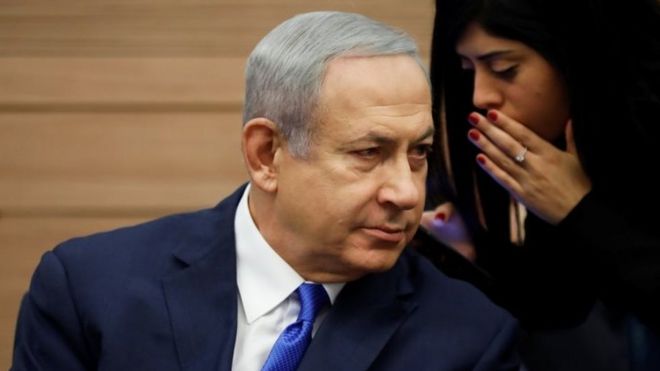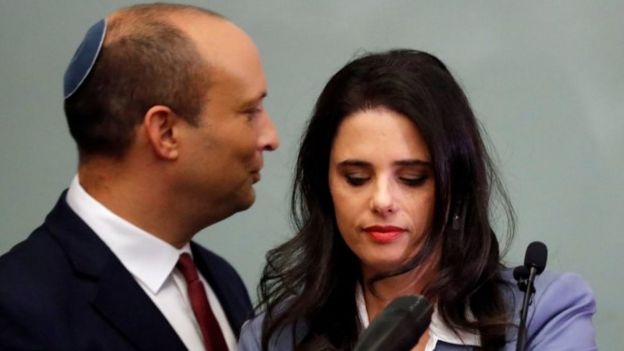Israel's Netanyahu survives early poll threat
Israel's government appears to have survived a possible collapse after a key partner withdrew a threat to leave the coalition and force snap elections.
Naftali Bennett, of the Jewish Home party, had signalled he would quit, but announced on Monday he would stay on.
PM Benjamin Netanyahu has held talks with ministers in recent days to try to keep his coalition together.
The crisis began when the defence minister resigned in opposition to an Israeli ceasefire with Gaza militants.
Mr Bennett had said he would pull his party out unless he was appointed the new minister of defence.
Mr Netanyahu has assumed the role himself for the time being.
The withdrawal of Defence Minister Avigdor Lieberman and his Israel Our Home party left Mr Netanyahu's government clinging to a one-seat majority in the 120-seat Knesset (parliament).
Why did key coalition partner change his tune?
Education Minister Naftali Bennett, who leads the third largest party in the coalition, said on Monday that he and Justice Minister Ayelet Shaked would stay on so long as the prime minister addresses Israel's "deep security crisis".
"If the prime minister is serious in his intentions, and I want to believe his words from last night, I am saying here to the prime minister we are removing at this moment all of our political demands and will help you in the huge mission of making Israel win again," he told reporters on Monday.
Prime Minister Netanyahu on Sunday appealed against calling early elections, saying such a decision would be "irresponsible" because of current security concerns.
"In such a period you don't topple a government, in such a period you don't go to elections," Netanyahu said of recent escalation of tensions in the region.

A push to the right?
By Yolande Knell, BBC Jerusalem correspondent
Naftali Bennett's surprise decision to remain in the coalition is likely to mean a push for more legislation and action in the coming weeks to prove the government's right-wing credentials.
Prime Minister Netanyahu appears keen to avoid going to the polls early next year at a time when the attorney general is expected to decide whether to charge him in relation to a series of corruption cases. If he's charged, it would inevitably lead to calls to step down.
An election would also complicate plans by the Trump administration - which has promised it will soon unveil its peace plan to end the Israel-Palestinian conflict.

Where does Netanyahu's coalition stand?
Under the law, elections are not due until November 2019 at the latest.
If Mr Bennett had withdrawn his nationalist Jewish Home party from government, Prime Minister Netanyahu would have been left with a minority government making snap elections more likely.
However, as it stands he still has 61 out of 120 of the parliamentary seats in the Knesset - which means further disagreements between coalition parties could still collapse the government.
The current government has been in power since March 2015. It comprises mostly nationalist and religious parties which take a hard line towards dealing with the Palestinians and reject the notion of trading occupied land for peace.
All Israeli governments are coalitions because of Israel's system of proportional representation, meaning no single party can govern alone.
Recent polls show Prime Minister Netanyahu, who has won four elections, is a favourite amongst the electorate and his Likud party has the most support.
How did the crisis come about?
Mr Lieberman and Mr Bennett both opposed the prime minister's decision to cease fire with Palestinian militant group Hamas last week after an escalation in violence between Israel and the militants in Gaza.
On 11 November, an undercover Israeli unit was intercepted in Gaza and an ensuing firefight - involving Israeli tanks and aircraft - left seven Palestinian militants and one Israeli commando dead.
Hamas unleashed some 460 rockets and mortars at Israel over the next 48 hours - the heaviest barrage since the two sides fought a war in 2014. Israel responded with 160 air strikes, targeting militant sites in Gaza.
The violence killed seven more people in Gaza and one person in Israel.
Last Tuesday, Hamas and Israel agreed to cease fire after Egyptian mediation - a decision which Mr Lieberman and Mr Bennett called "a surrender".
Mr Lieberman said it made his position untenable, while Mr Bennett demanded to become defence minister "so that Israel will go back to winning".



No comments